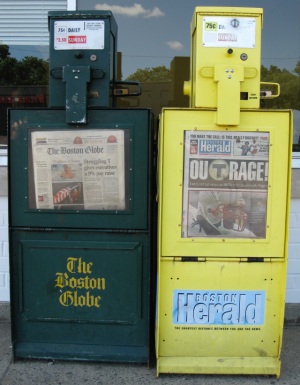
The U.S. Supreme Court on Thursday unanimously upheld a 2017 ruling by the FCC to loosen media ownership regulations, including an end to the so-called cross-ownership ban. That ban prohibits one entity from owning a newspaper and a TV or radio station in the same market.
The FCC’s long, tortured history on cross-ownership shaped the Boston media scene from the 1950s through the ’80s. Although the ban wasn’t formalized until 1975, the FCC had much to say about the issue well before that. No one told the story better than John Aloysius Farrell in his 2001 book “Tip O’Neill and the Democratic Century,” which I wrote about for The Boston Phoenix.
It’s a pretty amazing tale, and it’s crucial if you want to understand how the dynamic between The Boston Globe and the Boston Herald played out over the course of those decades. The very short version: the Boston Herald Traveler, with the support of the Kennedys, obtained the license to Channel 5 in the 1950s through corrupt means. The Globe, with the help of O’Neill, then a young congressman, exposed that corruption. That, in turn, led to the Herald’s losing the license to Channel 5 in the early 1970s, thus cementing the Globe’s status as the city’s dominant daily newspaper.
The final act played out in the late 1980s when Rupert Murdoch, who then owned the Herald, bought Channel 25 and sought a waiver from the FCC that would have allowed him to keep both. Sen. Ted Kennedy slipped an amendment into a bill that made it virtually impossible for the FCC to grant such a waiver. Several years later Murdoch sold the Herald to Pat Purcell, a longtime lieutenant. Although the Herald enjoyed a few years of prosperity under Purcell, it eventually entered a long, slow decline, ending in bankruptcy and the sale to the hedge fund Alden Global Capital in 2018.
So now that the cross-ownership ban is gone, what’s next? A number of organizations, including the media-reform group Free Press, opposed the FCC’s move, arguing that it will make it more difficult for local groups, including those representing women and people of color, to acquire media outlets. I agree, although there’s also a case to be made that newspapers and, to some extent, broadcast media are so moribund that ownership regulations are more about the last century than this one.
It does seem likely to me that we’re going to see newsrooms that combine newspaper and broadcast operations in an attempt to save money. We’ll see less diversity and less coverage as a result. But given that virtually all media have shifted to the unregulated internet, the ultimate effect of such consolidation is yet to be determined.
Discover more from Media Nation
Subscribe to get the latest posts sent to your email.